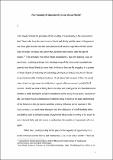Files in this item
Fair equality of opportunity in our actual world
Item metadata
| dc.contributor.author | Sachs, Benjamin | |
| dc.date.accessioned | 2016-07-07T14:30:15Z | |
| dc.date.available | 2016-07-07T14:30:15Z | |
| dc.date.issued | 2017-01-08 | |
| dc.identifier | 243534336 | |
| dc.identifier | b1849b48-0414-4cc8-9694-4a310bff376c | |
| dc.identifier | 85009458793 | |
| dc.identifier | 000411999600003 | |
| dc.identifier.citation | Sachs , B 2017 , ' Fair equality of opportunity in our actual world ' , Theory and Research in Education , vol. 14 , no. 3 , pp. 277-294 . https://doi.org/10.1177/1477878516676712 | en |
| dc.identifier.issn | 1477-8785 | |
| dc.identifier.other | ORCID: /0000-0002-2307-7620/work/69029289 | |
| dc.identifier.uri | https://hdl.handle.net/10023/9088 | |
| dc.description.abstract | Fair equality of opportunity, a principle that governs the competition for desirable jobs, can seem irrelevant in our actual world, for two reasons. First, parents have broad liberty to raise their children as they see fit, which seems to undermine the fair equality of opportunity–based commitment to eliminating the effects of social circumstances on that competition. Second, we already have a well-established principle for distributing jobs, namely meritocracy, thereby leaving no theater in which fair equality of opportunity can operate. I argue that we can solve both of these problems by conceding, in contrast to previous fair equality of opportunity defenders, that there’s no unique good associated with the right job, while insisting that there is a unique bad associated with the wrong job and holding that fair equality of opportunity should govern the competition to avoid that bad by attaining the right job. This move enables new responses to the two problems previously mentioned. In response to the meritocracy problem, I propose simply accepting that that principle should guide the distribution of jobs and all the associated goods while maintaining that there is room for a separate, non-consequentialist principle whose function is to ensure a fair distribution of chances to avoid the unique bad just identified. In response to the parental liberty problem, I argue that, for any given person, which job will deliver the unique bad I identify is contingent on her skills, and therefore, the way she is raised determines what would constitute a bad employment outcome for her, but doesn’t affect her chances of avoiding that outcome. | |
| dc.format.extent | 18 | |
| dc.format.extent | 191117 | |
| dc.language.iso | eng | |
| dc.relation.ispartof | Theory and Research in Education | en |
| dc.subject | Equality of opportunity | en |
| dc.subject | Jobs | en |
| dc.subject | John Rawls | en |
| dc.subject | Meritocracy | en |
| dc.subject | Parental liberty | en |
| dc.subject | LB Theory and practice of education | en |
| dc.subject | B Philosophy (General) | en |
| dc.subject | T-NDAS | en |
| dc.subject.lcc | LB | en |
| dc.subject.lcc | B1 | en |
| dc.title | Fair equality of opportunity in our actual world | en |
| dc.type | Journal article | en |
| dc.contributor.institution | University of St Andrews. Philosophy | en |
| dc.contributor.institution | University of St Andrews. St Andrews Centre for Exoplanet Science | en |
| dc.contributor.institution | University of St Andrews. Institute of Legal and Constitutional Research | en |
| dc.identifier.doi | 10.1177/1477878516676712 | |
| dc.description.status | Peer reviewed | en |
This item appears in the following Collection(s)
Items in the St Andrews Research Repository are protected by copyright, with all rights reserved, unless otherwise indicated.

